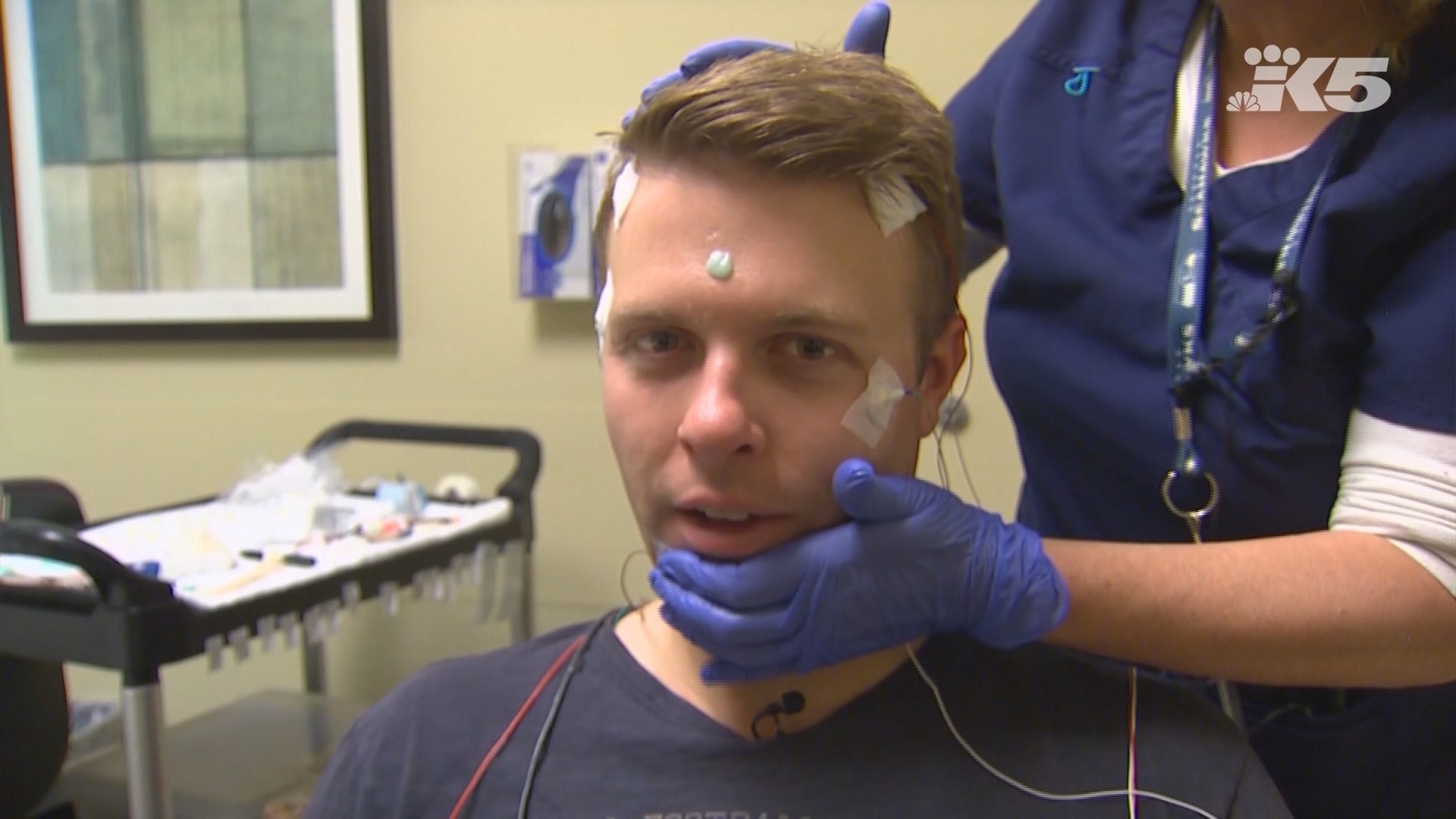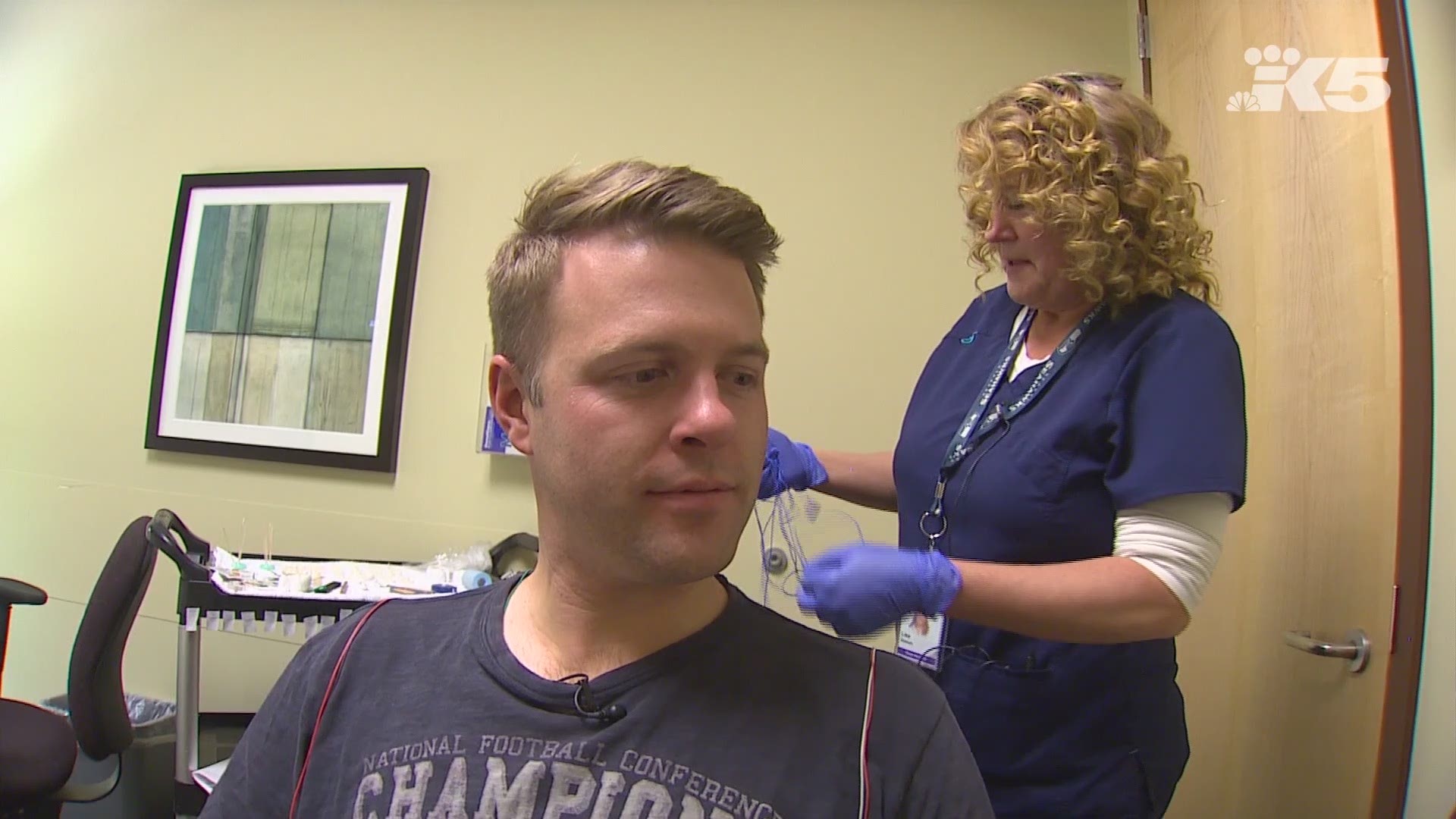SEATTLE — If you suspect you might have a sleep disorder, your doctor may recommend that you undergo a sleep study.
A sleep study allows doctors to monitor you while they sleep to see what's happening in your brain and body. They hook you up with electrodes to watch the different cycles of sleep that you go through during the night, looking for possible disruptions in your sleep pattern. The sensors measure your brain waves, eye movements, body movements, oxygen levels, heart rate and more.
KING 5's Jake Whittenberg and Mimi Jung went through an overnight sleep study at Swedish Sleep Medicine and documented the process. Here are their answers to the most common questions:
1. When do you check in and how much time do you need to spend in a sleep lab?
Mimi: Most patients check in at 8 p.m. for an overnight sleep study, but Swedish works with your work and personal schedule. For people who work graveyard shifts, they can check in during the morning hours and sleep during the day.
You need to spend six hours in the lab and of those hours, you need to be asleep for two of them in order to get the data. So if you need to get to your job early in the morning, you can get up when you need, shower and go to work straight from the sleep lab. After you check in, they show you your room, which is private and feels more like a hotel room than a hospital room. They ask you to fill out a questionnaire, they take your vitals, you change into your PJs and then they hook up the wires. It takes about 10 minutes for the technician to attach the sensors. Then, you're off to bed!
Jake: It was nice to know that the sleep lab could work around my schedule. I was worried about whether I'd be able to sleep at an unusual time.
There isn't a lot of time needed to get checked in and escorted back to the room. It takes about 90 minutes before you're hooked up and laying in bed.
Swedish told us that insurance requires you be in the sleep lab for at least six hours. But technically, the doctor only needs a two hour slice of you sleeping. So if you're worried, don't be!
2. How did you sleep with the wires attached to your body?
Mimi: I actually slept pretty well, considering it was a new environment - it wasn't my own bed and I had so many wires attached to my body! I slept a lot on my back, which is not my normal sleep position. So, I felt myself waking up a few times in the night. I wish I had brought my own pillow, which is something they welcome and encourage. I was able to adjust the thermostat to what was comfortable for me and our technician Lisa made sure I was as comfortable as possible.
Jake: There are quite a few wires. They're hooked up to your body from your calves to the top of your head. They have to use a goo substance to get the electrodes to stick too. All of that is connected to a control panel that you can literally carry along with you if you need to.
Once I was in bed, it was easy to lay comfortably. But, I'm a stomach sleeper so that was a challenge. I slept on my back all night which is not exactly normal. I was always aware that I was hooked up. I propped up the pillows and made it comfortable. The mattress was great, actually.
3. What happens if you have trouble falling asleep?
Mimi: I didn't have any trouble falling asleep at all! I usually don't struggle with that and even though I was in a sleep lab, it only took me three minutes to fall asleep.
Jake: Luckily, I fell asleep in under five minutes. I'm told that not being able to fall asleep it totally normal.
The room includes a TV, night light, full bathroom, pillows and all the blankets you need. They brought in a fan at my request.
The sleep techs are there at the push of a button. Luckily, there is no rush to fall asleep. They'll get the data they need with whatever sleep you give them.
4. How did you feel about a technician watching you sleep?
Mimi: It didn't bother me one bit. I knew she would be more focused on her computers showing her all the data.
Jake: Before I knew how it worked, I thought we would be in a room with one-sided mirrors and see a whole room full of people watching me - not the case. Our sleep technician made it clear that she would be bored if she sat and watched us sleep all night. I knew that the visual sight of me sleeping wasn’t the most important thing anyway. You are sleeping in a shirt and shorts so it doesn't matter if anyone see me to be honest.
5. What happens when you need to use the bathroom in the middle of the night?
Mimi: I slept so soundly. I didn't get up to use the bathroom. But if I needed to, I would push the call button to alert the technician. She would come in to detach the box with the wires from the wall so I would be free to walk to the bathroom.
Jake: I woke up around 4:30 a.m. and had a split second of awkwardness to press the call button. Our sleep tech answered right away, came into the room and unplugged me so I could use the bathroom in my room. The wires are still connected to your body, but you carry your control panel with you. All good.
6. What were the results of your sleep study?
Mimi: Dr. Sarah Stolz told me that I am an "abnormally efficient sleeper." That basically means I slept like a rock, hardly woke up, and am asleep for more than 90% of the time I'm in bed. I slept about eight hours. The technician had to wake me up.
My oxygen levels were perfect, so I don't have any issues with breathing. She said my results indicate I am sleep deprived, which is not surprising given the hours that I work.
Jake: This was the surprising part for me. Little did I know, I have mild sleep apnea. Even when I thought I slept soundly, the data shows I woke up about 13 times an hour.
My oxygen levels were also around 86% which is lower than needed too.
Dr. Stolz went through the results carefully with me and made sure I understood them.
7. What does the doctor recommend?
Mimi: She recommended that I get more sleep. She also warned me that my sleep deprivation could affect my attentiveness when I'm driving.
Jake: Treatment.
Thankfully, my case is only mild, so it doesn't require drastic measures. The most effective remedy is the sleep mask. There is also an option for a mouth piece that could help.
The doctor also suggested I continue to exercise and strengthen my neck muscles to ensure it doesn't get worse.
I think I'm going to take her advice and seek treatment.
I learned a ton, and it turns out, more people have it than I realized.


